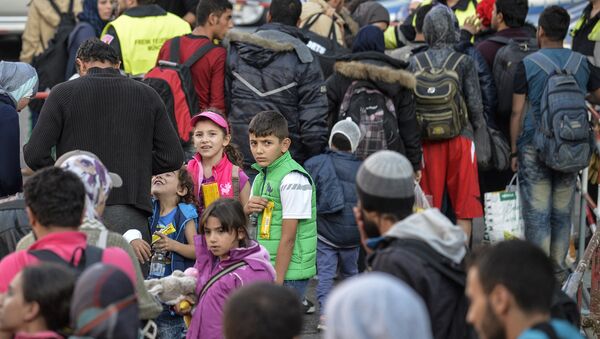Asylum seekers in Bavaria are holding a protest march to air grievances about their treatment in Germany, German news outlet BR24 reported on Friday.
The group of approximately 100 refugees and migrants set off from Munich's Sendlinger Tor on Friday, on the first leg of the march to the nearby town of Garching. The march organizers told BR24 they expect up to 300 asylum seekers to take part in the demonstration.
The refugees eventually aim to arrive on October 20 at the Federal Office for Migration and Refugees in Nuremberg, about 175 km away. There, they will demand the unconditional right to stay in Germany, and an end to racism and exclusion.
The group has set up a Facebook page asking for donations to the cause.
The group has been protesting at Sendlinger Tor, a historical city gate in southern Munich, since the beginning of September.
"We are living in inhuman conditions. The refugee camps are modern prisons, there is restriction of movement, we are not allowed to learn and earn money, not allowed to be a part of society. Because our countries are declared to be safe countries like Afghanistan, Pakistan, Senegal, Gambia and many others. Because our life does not matter in this world! We are protesting to have our basic human rights. And we are protesting because every life should matter," they explain on their website.
At a press conference, Afghan asylum seeker Adeel Ahmed told the Suddeutsche Zeitung that the refugees are marching to Nuremberg because their protest in Munich appears to have fallen on deaf ears.
"Is it necessary to start a hunger strike in order to be heard," Ahmed asked journalists.
The state of Bavaria registered the arrival of over 475,000 migrants and refugees last year. Two thirds of those arrivals were subsequently moved on to other areas of Germany while their asylum applications were processed.
This year's figure includes more than 11,000 repeat applications from asylum seekers who initially had their claim rejected.
Last month German Interior Minister Thomas de Maiziere stated that 890,000 refugees and migrants arrived in Germany in 2015, less than the previously cited figure of 1.1 million.
De Maiziere attributed the discrepancy to multiple registrations and undocumented further travel by migrants to other countries, or back to their homeland.



